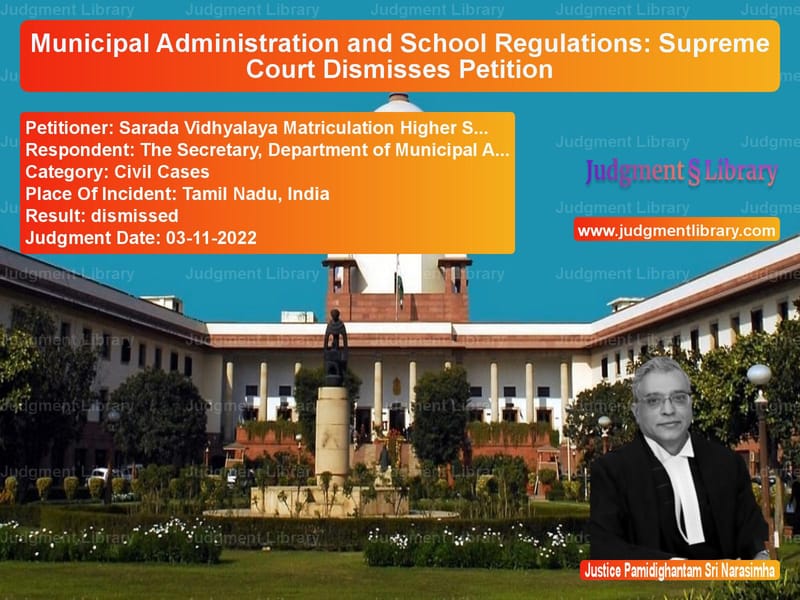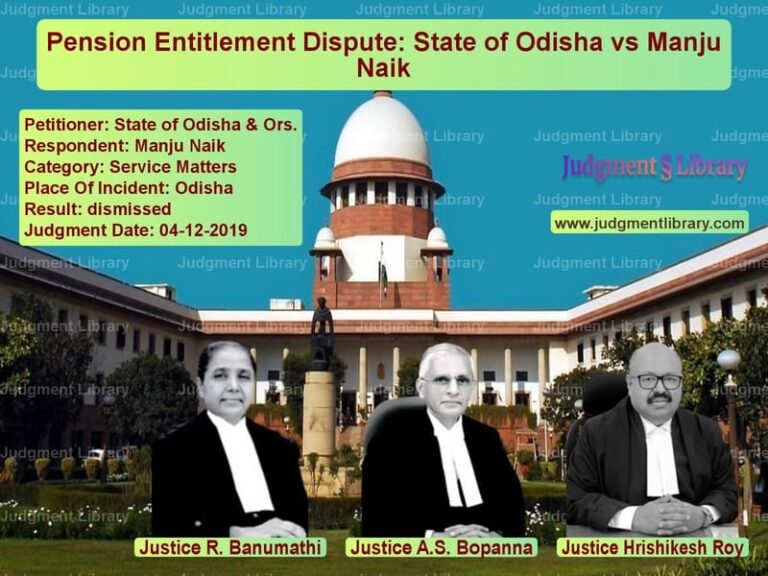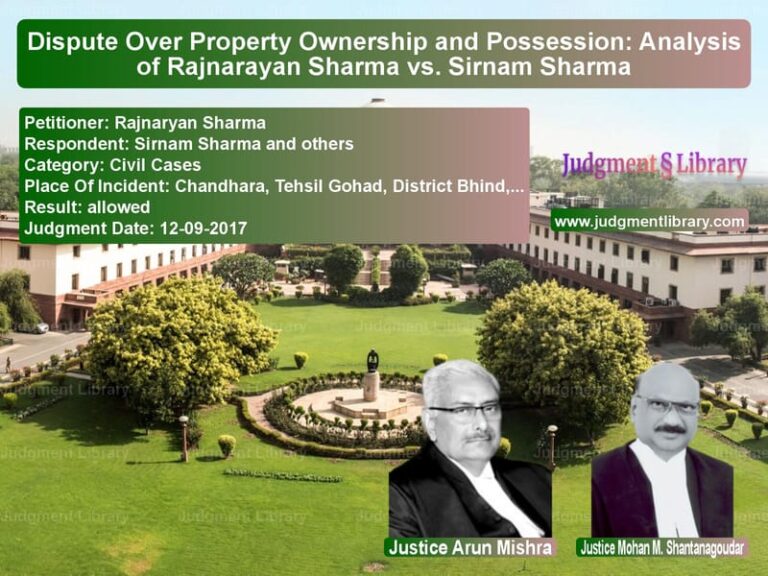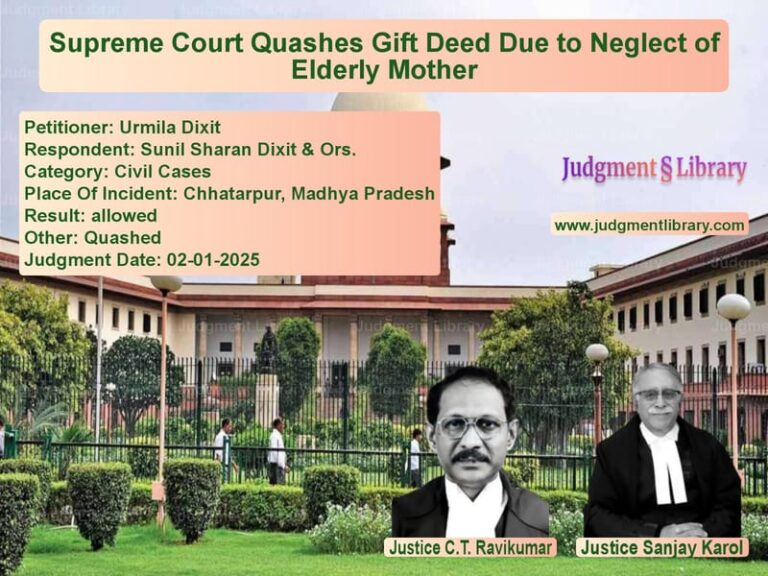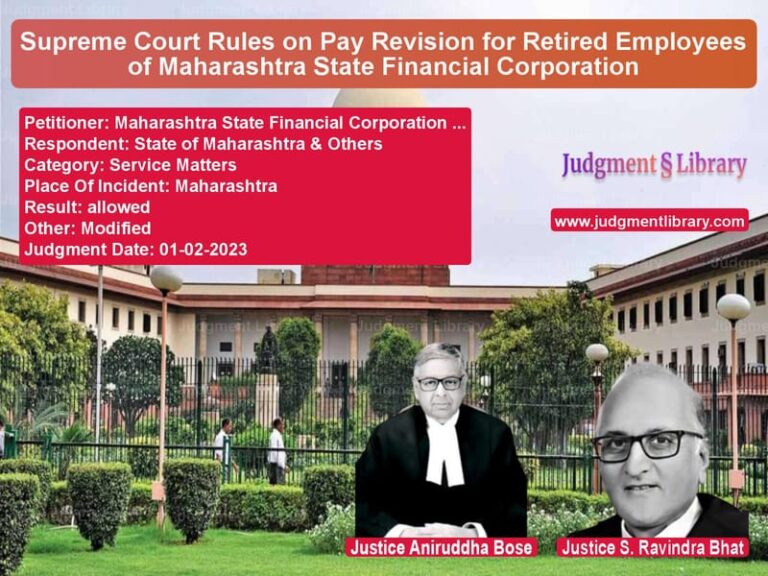Municipal Administration and School Regulations: Supreme Court Dismisses Petition
The Supreme Court of India recently ruled on a case involving the conflict between municipal administration regulations and the rights of private educational institutions. The case was filed by Sarada Vidhyalaya Matriculation Higher Secondary School against the Department of Municipal Administration and Water Supply. The petitioner challenged the regulatory powers of municipal authorities over school management and sought relief from various administrative decisions affecting the functioning of the school.
Background of the Case
The dispute arose when the municipal authorities imposed certain restrictions and administrative measures on Sarada Vidhyalaya Matriculation Higher Secondary School. The school, a private institution, argued that these measures were arbitrary and affected its ability to function independently.
Several similar cases from different institutions were clubbed together for hearing. The core issue revolved around the extent of municipal control over private schools, particularly concerning land use, sanitation, water supply, and fire safety compliance.
Petitioner’s Arguments
The petitioners argued that:
- The regulations imposed by the municipal authorities exceeded their legal mandate and interfered with the school’s autonomy.
- Private educational institutions have the right to manage their affairs without excessive intervention from local government bodies.
- The conditions imposed by the municipal authorities were not uniformly applied to all schools, leading to discrimination against private institutions.
- Several measures, such as restrictions on the use of school premises and additional licensing requirements, were introduced without proper consultation.
Respondent’s Arguments
The municipal authorities defended their actions, stating that:
- Their regulations were aimed at ensuring the safety, hygiene, and proper functioning of educational institutions.
- The rules applied to both public and private schools, and any additional requirements were necessary to meet urban planning and safety standards.
- Municipal authorities had the legal power to enforce such regulations under existing laws governing educational institutions and urban infrastructure.
- The restrictions imposed were within reasonable limits and did not violate the fundamental rights of the petitioners.
Supreme Court’s Observations
The Supreme Court analyzed the competing claims and made several key observations:
- The regulation of schools by municipal authorities must be within the limits prescribed by law and cannot be arbitrary.
- While private schools have the right to manage their affairs, they must comply with essential safety and infrastructure standards imposed by municipal bodies.
- The petitioners failed to establish that the municipal regulations were applied in a discriminatory manner.
- The argument that municipal authorities lacked jurisdiction over private schools was not legally sustainable.
Supreme Court’s Verdict
The Supreme Court dismissed the petitions, holding that:
- The municipal regulations in question were valid and necessary to ensure compliance with urban infrastructure and safety norms.
- Private schools must adhere to reasonable restrictions imposed by local governing bodies.
- There was no substantial evidence of arbitrary or discriminatory application of the rules.
Accordingly, the Supreme Court upheld the validity of the municipal regulations and dismissed the petition filed by Sarada Vidhyalaya Matriculation Higher Secondary School and others.
Key Takeaways from the Judgment
This ruling clarifies the relationship between municipal authorities and private schools:
- Regulatory Compliance: Private educational institutions must comply with municipal regulations concerning safety, sanitation, and infrastructure.
- Scope of Municipal Powers: Local authorities have the jurisdiction to impose reasonable conditions on schools operating within their municipal limits.
- Balancing Autonomy and Public Interest: The judgment reinforces that private institutions can manage their affairs but must adhere to rules that serve broader public interests.
Conclusion
The Supreme Court’s decision in Sarada Vidhyalaya Matriculation Higher Secondary School v. The Secretary, Department of Municipal Administration & Ors. upholds the authority of municipal bodies to regulate educational institutions within their jurisdiction. This ruling serves as a precedent for future disputes involving the regulation of private schools and reinforces the need for compliance with public safety and urban planning requirements.
Petitioner Name: Sarada Vidhyalaya Matriculation Higher Secondary School.Respondent Name: The Secretary, Department of Municipal Administration and Water Supply & Ors..Judgment By: Justice Pamidighantam Sri Narasimha.Place Of Incident: Tamil Nadu, India.Judgment Date: 03-11-2022.
Don’t miss out on the full details! Download the complete judgment in PDF format below and gain valuable insights instantly!
Download Judgment: sarada-vidhyalaya-ma-vs-the-secretary,-depar-supreme-court-of-india-judgment-dated-03-11-2022.pdf
Directly Download Judgment: Directly download this Judgment
See all petitions in Education Related Cases
See all petitions in Public Interest Litigation
See all petitions in Legislative Powers
See all petitions in Judgment by P.S. Narasimha
See all petitions in dismissed
See all petitions in supreme court of India judgments November 2022
See all petitions in 2022 judgments
See all posts in Civil Cases Category
See all allowed petitions in Civil Cases Category
See all Dismissed petitions in Civil Cases Category
See all partially allowed petitions in Civil Cases Category

